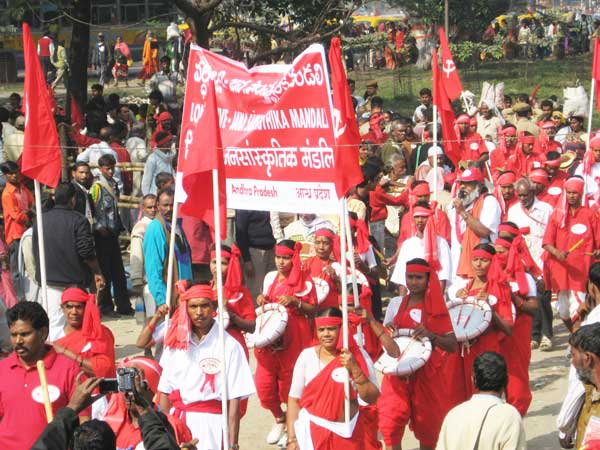 Paschimbanga Ganasanskriti Parisad, Jan Sanskriti Manch and Sodou Assam Janasanskriti Parisad organized an all-India cultural festival on 16 and 17 December at the historic Esplanade in Kolkata. The festival sketched out the panoramic scape of diverse cultural outfits from all over the country that embody the striving for a revolutionary people’s culture. Comrade Ramji Rai announced the inauguration of the conference from the open-air stage named the Hemango Biswas Manch on the afternoon of 16 December. Cultural workers from different provinces participated and exchanged their views. Their performances upheld the spirit of the festival’s main slogan: “culture of creation, culture of resistance, culture of people”.
Paschimbanga Ganasanskriti Parisad, Jan Sanskriti Manch and Sodou Assam Janasanskriti Parisad organized an all-India cultural festival on 16 and 17 December at the historic Esplanade in Kolkata. The festival sketched out the panoramic scape of diverse cultural outfits from all over the country that embody the striving for a revolutionary people’s culture. Comrade Ramji Rai announced the inauguration of the conference from the open-air stage named the Hemango Biswas Manch on the afternoon of 16 December. Cultural workers from different provinces participated and exchanged their views. Their performances upheld the spirit of the festival’s main slogan: “culture of creation, culture of resistance, culture of people”.From the roots of folk culture to the modern aesthetic, from art to activism, the festival was full of the spirit of cultural resistance against the policy of SEZs, imperialist globalization and the bankruptcy of the politics of the ruling class. The cultural performance began with a rousing mass-song presented by the cultural team of West Bengal. Noted musician and folk singer Loknath Goswami presented Assamese folk-songs which really charmed the audience. The colour and vigour of Rangbhoomi of Begusarai, the tribal tune presented by Prerna from Jharkhand, the nimbleness and gracefully athletic leaps of the Chau dance performance by Sengel from Jharkhand, the agrarian mourning song rendered by Chandrakanta Terang of Karbi Anglong – all upheld the cultural identity of peasant life and struggle and added a dimension to the conference. Young men and women artists from Assam presented a traditional Bihu dance. The elegance and authenticity of their performance were loved by the audience. The dramatic performance staged by the central team of Andhra Pradesh (Jan Sansritik Manch) mesmerized people with its dynamic form and rebellious content. The dance, theatric action, music, and sense of rhythm - every aspect of performance contributed to narrativise the story of the rise of the people against oppression and exploitation. Yuvaniti from Bhojpur, which had spent several weeks before the 8th Congress campaigning in the villages of Bhojpur, also participated in the festival. Revolutionary songs of a variety of moods by Hirawal (Patna) and Dasta (Banaras) were greatly appreciated by the audience.
Noted young theatre personalities of Bengal Kausik Sen, Manish Mitra and Arpita Ghosh who took the lead role in recent civil society movement against Nandigram massacre and Left front government’s anti-peasant land grab policy in the state came to express their solidarity. Addressing the people Sen said, “We, the cultural workers of West Bengal are fighting the SEZ and capitalist development policies of the state government. And all over the country people are fighting the same issues. Let us try to tie up all these struggles in a single thread. A broader level of coordination among culture-politics-academia is required to consolidate ourselves.” He concluded, “We must learn a lot from the people’s cultural movements.” Mitra and Ghosh paid their tribute to the revolutionary masses of the country who are protesting against the ruthless anti-people policies. Ghosh also recited a Bengali poem there.
A film ‘Development at Gunpoint’ made by Promod Gupta of Media Solidarity Group was shown. The film depicted the resistance the people of Nandigram against the brutal aggression of the police and CPI (M) cadres in January and February 2007. Supriyo, Barun and Sumita introduce the Media Solidarity Group as an organization of young filmmakers which aims to make films on people’s resistance all over the South Asian region and they expressed their solidarity with the revolutionary mass gathered there.
On the second and final day of the conference, collected works of eminent Marxist poet late Kamalesh Sen published by Nabanno and P.B Ganasanskriti Parisad was released by noted poet Nabarun Bhattacharya. Poet Sabyasachi Dev and veteran theatre personality Bibhas Chakraborty were also present there. Paying his tribute Bhattacharya says that the life and work of a poet like Kamalesh Sen is always an inspiration to the young writers who leave the beaten track of institutional culture and choose the path of people’s culture. The book release event was followed by mass-songs sung by Choler Pathe group of Budge Budge and Bally, W.B and mime-ballet presented by the troop from Thakurnagar, W.B.
‘Mokaam’, a group which composes and sings new Bengali modern and folk songs sang two Bengali songs and Abhijit Basu, promising folk singer sang three songs. The final attractions of the cultural conference were a dance performed by the troupe from Karbi, Assam and a satire ‘Duniya Roz Badalti Hai’ staged by Hirawal which in a most popular way exposes the pro-imperialist and anti-people character of NDA and UPA governments. The cultural festival ended with high spirits, announcing the hope of new revolutionary interventions in people’s culture in the near future.